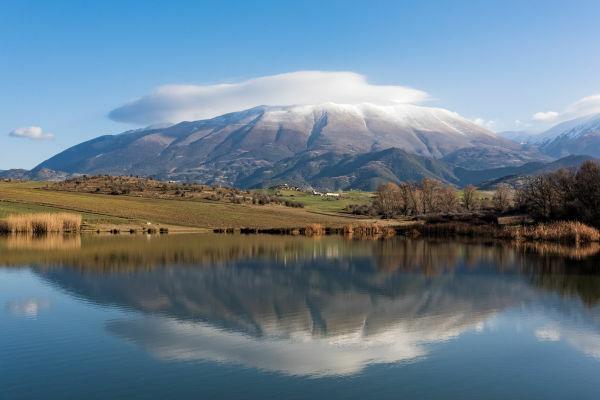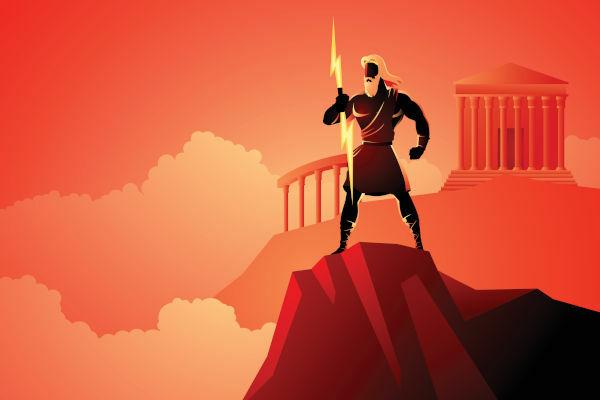You godsgreeks they were deities that were part of the religiosity of the ancient Greeks. They were seen as immortal beings and represented forces of nature, abilities and abstract concepts. The main Greek god was Zeus, the king of the gods. According to mythology, the main Greek gods, with the exception of Hades, resided on Mount Olympus.
Accessalso: The mythology that was part of Norse religiosity
Greek mythology
The Greek gods were the deities that formed the pantheon of the religion of the ancient greeks. This religion is commonly called Greek mythology and was polytheist, that is, formed by different gods. The Greeks believed that their gods were immortal and that they represented both the forces of nature, such as lightning and the seas, as abstract concepts, such as wisdom and beauty.

It is important to mention that religion in Greece was not clear and defined as we understand it in the modern concept. So when we talk about ancient Greek religion, we are talking about a set of beliefs that have undergone profound transformations over periods of Greek history. Still, religion was something of the utmost importance to the ancient Greeks.
In Greek religion, the main gods resided on the summit of Mt.Olympus. It was believed that there was a palace in this place, where the Olympian gods lived. However, there were Greek gods who did not reside on Olympus. Furthermore, in the case of the Olympian gods, it is worth mentioning that Poseidon also had a residence at sea.
The gods were of great importance to the Greeks, having temples in their honor, and many of them became patronsinwhole cities. The city of Athens, for example, had in Athena its patroness, while Corinth had in Aphrodite its patron goddess.
In Greek belief, the gods possessed formhuman, but were immortal. The gods fed on ambrosia and nectar, a food and drink that could only be consumed by the gods, for humans who consumed both would die.
Despite immortality, the Greek gods, as well as mortals, possessed conflicts and moral dilemmas. So they might grieve; feeling hate, jealousy and envy; falling in love with someone, getting married, betraying your partner, etc. There were also gods who involved themselves with human beings, and it was common in myths for gods to have children by mortal women. The actions of the gods were directly reflected in the lives of human beings and they could interfere in the lives of mortals at will.
The stories of the Greek gods was passed down orally, from generation to generation. Only through the actions of intellectuals such as Hesiod and Homer that these legends were recorded in text and saved for posterity. Much of what we know today about the Greek gods comes from knowledge inherited from the writings of these two.
The two best known works by each of these authors are:
Theogony and Works and Days, of Hesiod;
Iliad and Odyssey, from Homer.
Accessalso: Ragnarök, the end of the Universe for the Vikings
Origin of the Greek Gods
Myths are understood by historians as a way for man to try to explain the phenomena of nature and reality. This was no different with the Greeks, who had a variety of myths to explain phenomena such as the emergence of the Universe. You Greek myths also narrated the rise of the gods, as we will see.
In Greek belief, the Universe was, at first, a disorganized cosmic mass, which was called Chaos. In this cosmic mass, the fundamental elements came together: earth, sky, fire and water. At some point, the Earth took shape through the emergence of gaia, goddess known to have the form of the Earth.
Shortly after Gaia's appearance, Uranus, known as the starry sky, appeared. Gaia and Uranus joined together lovingly and from that union several children were born. these were the Titans and titanids, gigantic beings that inhabited the Earth before the appearance of human beings. One of those titans was chronos, who rebelled against his father.

Uranus cursed Kronos, condemning him to suffer a curse for turning against his own father. With this, Kronos assumed his father's position as king of the Universe, married a titanide named Rhea and, with her, had several children. However, Kronos feared that his children would turn against him and so he devoured them all at birth.
The children of Cronus and Rhea are some of the best known gods in Greek mythology. The best known of them all is Zeus, god of lightning and thunder. He was saved by his mother before Kronos could devour him. So he grew up hidden from Kronos and then returned to fight his own father.
Zeus freed his brothers and with them he started a war against Kronos. At the end of this confrontation, Cronos was defeated and locked in Tartarus, along with other titans. In recognition of his achievement, Zeus was presented with lightning and thunder. With his brothers he carried out the division of the Earth. Zeus took the sky; Hades, with the underworld; and Poseidon, with the waters.
From that, Zeus became the king of the Universe, and the gods of Olympus came to have dominion over Earth and men. Zeus was the most important god and therefore became known as king of the gods. He was the ruler of Olympus and married to Hera, another goddess who resided on Mount Olympus.
Among the sons of Cronus who were rescued by Zeus are Poseidon, Hades, Hera, Hestia and Demeter. They were all important gods to the Greeks.
Accessalso: The Valkyries and Norse Mythology
main greek gods

As we have seen, the main Greek gods resided on Mount Olympus, but it is worth remembering that also there were important gods that did not reside there and therefore are not known as gods. Olympics. In total, the Olympian gods are 12 and they are also known as part of the dodecateon (the pantheon of twelve gods).
You twelve olympic gods are as follows:
Zeus: king of the gods, ruler of Mount Olympus, god of the sky, lightning, thunder, etc.
Ivy: queen of the gods, goddess of marriage, women, family, etc.
Poseidon: god of the seas, water, storms, etc.
Athena: goddess of wisdom, crafts, etc.
ares: god of war, violence, etc.
Demeter: god of harvest, agriculture, seasons, etc.
Apollo: god of light, sun, prophecy, philosophy, poetry, music, art, plague, etc.
Artemis: goddess of hunting, virginity, the moon, etc.
hephaestus: god of metallurgy, fire, invention, volcanoes, etc.
aphrodite: goddess of love, passion, fertility, beauty, etc.
Hermes: messenger of the gods, god of travel, commerce, communication, diplomacy, etc.
Dionysus: god of wine, parties, theatre, etc.
There are some versions that feature hestia as a goddess who is part of the Olympian set of gods. In this interpretation, there would therefore be 13, not 12 Olympian gods. Hestia is recognized as a goddess of home and architecture. Another god very important in the religious belief of the Greeks is Hades, the god of the underworld. He not considered an olympic god, because he resided in the underworld, not Mount Olympus.
By Daniel Neves Silva
History teacher
Source: Brazil School - https://brasilescola.uol.com.br/mitologia/deuses-gregos.htm
